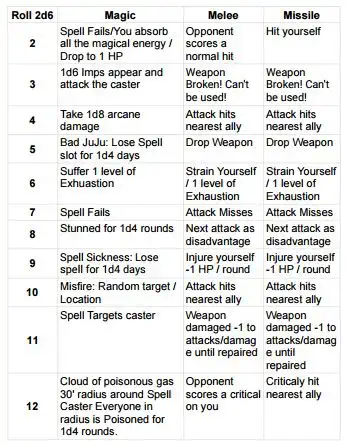House Rules
The normal 5e D&D rules will be modified by a combination of the 5e Hard Core ruleset and some elements of the Index Card RPG in order to give the game an old school feel. This is a list of the important changes.
Combat
Initiative
Everybody rolls initiative. Highest roll goes first and then everyone else goes in clockwise order around the table. Initiative will stay the same each round of the encounter unless or until something causes everyone to re-roll.Fast and Furious
Each combat round is 6 seconds long. When it is your turn to go in combat, you need to be prepared. There will be no delay for looking up spells or abilities, if you don't know what it does then you don't get to use it. It is recommended that you make notes on your character sheet, or on index cards and that when your turn comes up you have that card in your hand or on the table in front of you. You don't have time to have a conversation with the other characters. You can shout out a short sentence, but other characters can not respond until their turn. You need to make a decision for your character and execute it. If you ask what is going on then that is what your character spends the round looking around trying to figure it out, and we move to the next player.Armor and Equipment Damage
- If you take a Critical Hit your armor (75%) or shield (25%) loses one AC point until it is repaired. A shield that takes a second critical is destroyed completely and can not be repaired, unless it is magical. Armor that takes three critical hits is also completely destroyed unless it is magical.
- The Mending spell can repair armor or shields that have one critical hit, but not more than one.
Hordes
When multiple monsters are attacking a single player, for each one beyond the first a +1 will be added to the attack roll, and +1 will be added to the damage roll. There will be only one attack roll for that horde per round.Example: 5 bandits surround Hugo the Heroic. The bandits normally attack at +2 for 1d6+1 damage. Because five are attacking, the DM will make one roll at +6 (= +2 normal bonus +4 for 4 extra bandits). If that hits the damage rolled is 1d6+5 (=+1 normal bonus +4 for 4 additional bandits).This will speed up combat by reducing the amount of rolls needed per round. This rule does not apply to PCs surrounding a single enemy, as each PC will make their own attack and damage rolls.
Critical Success and Failures
Any roll of a natural 20 results in a critical success, and any roll of a natural 1 results in a potential critical failure. Spells & Spell Casting Spell casters can cast spells of their level or lower that they have memorized. A third level wizard can learn and cast Fireball. A spell is always cast at the casters level (a Cure Wounds cast by a 3rd level caster cures 3d8). There are no spell slots. If you have memorized a spell and have the components you can cast the spell. Divine casters can memorize a number of spells per day equal to their level + 2 (plus cantrips). Arcane casters can memorize a number of spells per day equal to their level * 2 (plus cantrips). Spell casters can cast any Ritual Spell that they know, even if it is not memorized. Spell components will be necessary and tracked. Spells cannot be cast without having the correct components. A Spell Component Pouch (25 gold) has enough components to cast ten spells. It does not include any components with named prices.Casting Spells
When you cast a spell of 1st level or higher you will roll a Spell Check (1d20 + Ability Mod). Cantrips do not require a Spell Check.- Nat. 1 Critical Failure - something bad is going to happen
- 2-9 Spell Fails
- 10-19 Spell Succeeds
- Nat.20 Critical Success - Spell goes off better than expected (double damage / double duration /disadvantage on saving throw / etc. Caster's Choice)
Healing
- Rest: In short rests, expend Hit Dice as normal, rolling each to determine HP regained in rest and safety.
- Medical Aid: When non-magical medicine, bandages, or tinctures are used, the healer must make a DC10 Medicine check. The patient may then roll 1 Hit Die, without needing to expend it. This expends 1 use from a Healer's Kit and takes 1 minute whether or not it is successful. To stabilize an unconscious person expends 1 use from the Healer's Kit and takes 1 action, but does not restore any hit points and does not require a Medicine check.
- Grit Your Teeth: In combat or danger, make a CON roll against DC 10 as an Action. If successful, expend 1 Hit Die, roll and recover that many HP.
Injured
You become INJURED any time you are hit with 10 or more damage in a single attack or effect or you are reduced to Zero or fewer hit points.
Once you are INJURED…- You cannot use Grit Your Teeth to recover Hit Points
- No roll you make benefits from an Attribute Bonus. Proficiency only
- Your DEX bonus, if any, no longer adds to your Armor Class
- Receive 10 or more points of healing magic from a spell, item or potion
- Receive 10 or more points of healing from medical means
- Take a long rest in safety and recover to full HP
Death
Death occurs whenever a character reaches -Constitution Ability score each round unstabilized reduces HP by -1 until you are dead or stabilized.Advancement
Gaining a Level
Leveling up has two components: Gaining enough experience points; and receiving training. Experience points will be awarded after taking a long rest in a safe location, usually back in town. Once a character has gained enough experience they are ready to undergo the final training and testing from their mentor. In order to advance to the next level, the PC must first find a mentor of that class who is at least two levels higher than the level you wish to achieve to start. After that the mentor can train you up to their level.For example, if Gronk the Dishwasher, wishes to become a 1st level rogue. He must find a third level rogue to train him. Once he has been taken as an apprentice, Gronk can then train with the mentor until he reaches that mentors level. After reaching the mentors level, Gronk can do his own research and training to continue to advance but it is more difficult, or he can find another mentor.To advance a level with a mentor, the PC must train with that mentor for one week x level to be gained (1st Level = 1 week / 2nd Level = 2 weeks / etc.), plus any other requirements the mentor might impose (gold / tasks / etc.). To train without a mentor takes one month x level to be gained, and can only be accomplished when the player is at least 3rd level (i.e. You need a mentor until you reach 3rd level), and any additional requirements will be determined by the GM. Training without a mentor requires a safe place to study and practice without interruption for 10 hours a day (safe location). In addition, PCs are expected to be training on the skills / abilities that they will be gaining during the run up to the next level, which means that the next level they wish to gain has to be announced beforehand, and the appropriate mentor found at that time. Players can mentor other players, but the rules apply in that situation as well.
Feats
The optional rule "Feats" is not available to use.Other Proficiencies
Your mentor can also train you in other proficiencies that you can pick up in-between levels once enough training has been completed.Gronk the 1st level Rogue, who started the game proficient in just "dagger", wishes to learn how to use a "short sword". He arranges with his mentor, Shania the Cutpurse, to learn the weapon. Shania trains him, and after a certain amount of training, Gronk can now use his Proficiency Bonus with short sword.This training can be with weapons, shields and armor, tools, languages, etc. The time needed and any cost associated with the training will be dependent on the skill being learned.



Comments